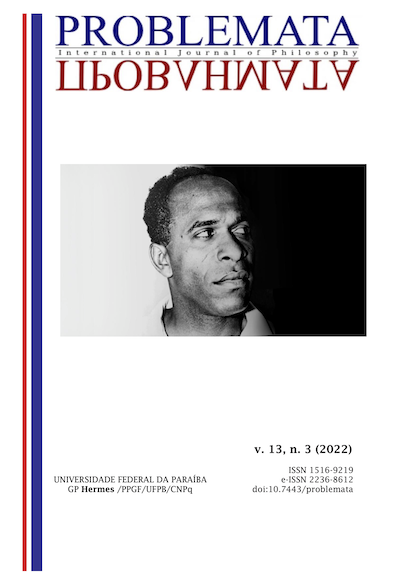THE CONCEPT OF PASSIONS OF THE SOUL IN DESCARTES
DOI:
https://doi.org/10.7443/problemata.v13i3.63872Keywords:
Passions of the soul, mechanism, sentiment, moral, DescartesAbstract
The concept of passions of the soul has not been the same since Descartes' first writings, as the philosopher deepens his understanding of the subject, especially from his correspondence with Princess Elisabeth of Bohemia. An example of this is the Treatise on the Passions, the last work published by the author during his lifetime (1649) and the culmination of his position on the theme of the passions. In this scenario, the present article seeks to trace a brief itinerary of the exchange of ideas that culminates in this treaty, highlighting the displacements and reformulations that Descartes promotes about the concept of passion. First, we will discuss the initial formulation of the category of passion made by Descartes in the Treatise on Man and in the Principles of Philosophy. Secondly, we selected some letters that allow us to explain the debate that led Descartes to review his position. And, finally, we indicate the concept of passions of the soul that Descartes arrives at in the Treatise on the passions.
Downloads
References
ALQUIÉ, F. (ed.). Galileu, Descartes e o mecanismo. Lisboa: Gradiva, 1987.
DESCARTES, R. Discurso do método; Meditações; As paixões da alma; Cartas, Objeções e respostas. In: Os Pensadores Vol XV. São Paulo: Abril Cultural, 1973.
DESCARTES, R. Œuvres de Descartes - 12v. ADAM, C.; TANNERY, P. (Ed). Paris: Léopold Cerf, 1901.
DESCARTES, R. Princípios da filosofia. Lisboa: Edições 70, 1997.
DESCARTES, R. Medicina dos afetos - Correspondência entre Descartes e a princesa Elisabeth da Boémia. Oieiras: Celta Editora, 2001.
DESCARTES, R. Regras para a direcção do espírito. Lisboa: Edições 70, 2002.
DESCARTES, R. O mundo (ou Tratado da luz) e O homem. Campinas: Editora da Unicamp, 2009.
DESCARTES, R. Discurso do método & Ensaios. São Paulo: Editora Unesp, 2018.
GARBER, D.; HENRY, J.; LYNN, J.; GARBEY, A. New doctrines of body and its powers, place and space. In: GARBER, D.; AYERS, M. The Cambridge history of seventeenth-century philosophy. EUA: Cambridge University Press, 1998, p. 553-623.
GILSON, E. Discours de la méthode - Texte et commentaire par Étienne Gilson. Paris: Bibliothèque des textes philosophiques - Librairie philosophique J. Vrin, 1987.
GUENANCIA, P. Lire Descartes. Paris: Gallimard, 2000.
GUEROULT, M. Descartes segundo a ordem das razões. São Paulo: Discurso Editorial, 2016.
KAMBOUCHNER, D. L’Homme des passions: Commentaires sur Descartes - II Canonique. Paris: Albin Michel, 1995.
RODIS-LEWIS, G. La morale de Descartes. Paris: Quadrige/PUF, 1998.
SALES, B. Descartes: das paixões à moral. São Paulo: Edições Loyola; Recife: Universidade Católica de Pernambuco, 2013.
TALON-HUGON, C. Descartes ou les passions rêvées par la raison: essai sur la théorie des passions de Descartes et de quelques-uns de ses contemporains. Paris: Vrin, 2002.
TEIXEIRA, L. Ensaio sobre a moral em Descartes. São Paulo: Brasiliense, 1990.
Downloads
Published
Issue
Section
License
Copyright (c) 2022 Abel dos Santos Beserra

This work is licensed under a Creative Commons Attribution 4.0 International License.
Authors who publish with this journal agree to the following terms:
- Authors retain copyright and grant the journal right of first publication with the work simultaneously licensed under a Creative Commons Attribution License that allows others to share the work with an acknowledgement of the work's authorship and initial publication in this journal.
- Authors are able to enter into separate, additional contractual arrangements for the non-exclusive distribution of the journal's published version of the work (e.g., post it to an institutional repository or publish it in a book), with an acknowledgement of its initial publication in this journal.
-
- Authors are permitted and encouraged to post their work online (e.g., in institutional repositories or on their website) prior to and during the submission process, as it can lead to productive exchanges, as well as earlier and greater citation of published work (See The Effect of Open Access).





